WE have had communicated to us the following brief, yet interesting, sketch of the early use of certain words, the meaning of which is familiar to our readers.
We publish it with pleasure, for though a chosen few may have been curious in their Masonic researches, and may have lighted on the substance of what follows, it is by no means improbable the bulk of Freemasons have but as light knowledge of the use of the three well-known terms in Masonry which the writer has chosen for illustration.
The first word we select is ” HELE. It is not at present in use in our current standard English, but yet it was once found in our best writers, and is yet in vogue in some out of the way districts, both in the west and north. In the west of England a man who has roofed a building says he has ” heled it.”
A mother in the north of England tells her child to ” hele it up ;” for the same action a mother in the south would say ” tuck well in;” in fact, the meaning is, ” to well or closely cover up.” It is not synonymous with “conceal,” from which it varies somewhat in meaning.
It is needless to say that its true signification ought to be pointed out to every E.A. Mason, for the explanation of the word in the First Lecture is very imperfect.
Halliwell, in his Dictionary of Archaic and Provincial Words, gives this word, at page 443, but does not give its northern use. John Wickliffe, in his Translation of the Bible, uses it (in various moods and tenses) no less than sixteen times, and with the meaning of ” covering” about four times. Chaucer uses the word three times.
Wickliffe’s Translation was made about A.D. 1380, and was in the language used by scholars and learned men of the time, or in the current language of the day.
Chaucer was a contemporary, but flourished a little earlier. The Bibles printed in Queen Elizabeth’s time do not contain the word at all; it had been dropped out of use by writers and general society in those days and become obsolete, and was only used by these-called un-polite; it is now going out of use even by such as these.
The next word that we propose to examine is “ABIF,” and a very curious word it is. It means ” Our Father,” and is from the Hebrew word “ABI.” It is not to be found in most English books. The first mention the writer can find in printed books is in Coverdale’s Bible of 1535, in 2 Chronicles ii. 13. ” HIRAM ABI.”
In these-called Matthew’s Bible, which was reprinted more than once, the word is used, but in every translation afterwards made it is, as we have it now, simply “HIRAM.” In German Bibles, of Luther’s translation, the word is ” ABIF,” at least, those the writer has seen, but he has not seen many. In an edition of 1716 there is this curious note : ” Some books have Hiram Abi, others name him simply Hiram.”
Of course the note is in the German language. It is known that Coverdale translated the Old Testament in Antwerp, and it is curious that a Flemish translation was published in that city in the very same year, 1535, that Coverdale printed his Bible, and in which, in 2 Chronicles ii. 13, occurs ” HUE AM ABI.” The coincidence is worth a further careful inquiry.
There is another word very commonly used by English Freemasons, and only by them, ” COWAN.” It is not to be found in any English book at present, nor is it in use amongst Englishmen of any grade or station in society. In tracing its history without any access to MSS. there is a great difficulty to contend with.
When an old MS. is printed some editors transpose the letters ” v ” and ” w “and some do not, and as they were used in old times inter-changeably, some Dictionaries not very old still mix up words beginning with those two letters. The first use of the word that the writer can find is by Peter Langtoft, who died about the year A.D. 1308.
He was a Yorkshire man, and a Monk at Bridlington ; in his History, see edition of 1725, vol. ii., page 303, using English type, we find “Thirty of ther couyn.” ” All these and wele mo atteynt of traytorie.”
Gower, in his ‘Confessio Amantis’, see Pauli’s edition, 1857, vol. i., page 42, uses the word ” covine” in the same sense. Gower was a contemporary with Chaucer, and Chaucer used the word ” covine ” several times, e.g. in ‘Romaunt of the Rose’, see edition 1721, page 241.”
“Wickid tonge, -whiche that the’ covine’
Of every lovir can devine.”
In the sixteenth century the word was lost to the learned, and was out of use by the polite of that time, as it is not used by Shakespeare or by the Divines and other writers of that period.
Of ” covitie we find that in the next century John Cowell, in his Law Dictionary, edition 1637, gives the word as a new term in law, and from the French word ” convenancer” or rather ” convenir,” and says, ” it is deceitful assent or agreement between two or more to the prejudice or hurt of another. T. Blount in his “Glossographia,”edition 1656, professing to give law terms, does not mention the word at all. Bailey, 1736, in his Dictionary, evidently merely copies Cowell.
Halliwell gives it as an archaic or obsolete word. Jamieson, in his Scottish Dictionary, edition 1817, gives ” Cowan,” 1st. One who does the work of a Mason, but has not been regularly bred. 2nd.One who builds dry walls. The word, he signifies, is Scottish only. From these examples Freemasons can have little difficulty in getting at the real meaning.
There is another circumstance that should be borne in mind, and that is when anything is written or composed for the use of numbers of men, it must be in the current language, or it will not be able to command any wide or enduring sympathy.
If the ritual of Freemasonry was to be made to-day we should not have either ” HELE,” ” ABIF,” or “COWAN;” they are dead words now to all Englishmen, except to attentive Freemasons, and we are only drawing a just conclusion when we say that those words were in current use when the respective parts of the ritual were composed or arranged.
It is fair also to conclude that they be reused in their present meaning not after the fifteenth century, though it is possible the second word may have been interpolated.
– The Freemason’s Chronicle – 16/9/1876
 The Freemasons Chronicle, a weekly record of masonic intelligence, was first published 2nd January 1875 London, England as an independent weekly journal of masonic interest and continued for 27 years.
The Freemasons Chronicle, a weekly record of masonic intelligence, was first published 2nd January 1875 London, England as an independent weekly journal of masonic interest and continued for 27 years.
It should be the business of a journal devoted to the interests of the Order to attempt the removal of prejudices such as these, which, though they may have little perceptible influence upon the prosperity of the Fraternity, yet have the effect of preventing timid or ill-informed persons from enlisting under its banner.
It will not only attempt to keep pace with the growing literary requirements of the day, but it will seek to exhibit the Order to the non-Masonic world divested of its technical details, and clothed in the garb of Charity and Brotherly Love.
The questions of the hour, which exercise the minds of thoughtful men, will be handled freely and broadly, without any tinge of political or sectarian bias.
The memoranda of Masonic gatherings which will appear from week to week, will be full and accurate; and as free interchange of opinion is one of the best signs of life and vigour in any society, ample scope will be given for Correspondence on topics of interest to the Order.
If we may venture upon a new rendering of words which recent events have made memorable, we will say here, once and for all, that we will be keen men of business, and will spare no effort, consistent with honour, to achieve commercial success; but first, and before all things, we will prove to our brethren and the world that we are FREEMASONS.
Recent Articles: The Freemason's Chronicle
 Operative And Speculative Masonry Explore the fascinating transition from Operative to Speculative Masonry in our latest post. Discover historical insights from Augustus C. L. Arnold and Rev. Wm. P. Strickland, shedding light on Freemasonry's evolution and its enduring principles. Dive into the rich history and significant milestones that shaped modern Freemasonry. - The Freemason's Chronicle - 2 September 1876 |
 Discover the true essence of Freemasonry, an ancient order founded on the profound principles of love for God and man. It's a call to rise above mere appearances, to embody genuine virtue and benevolence, transcending societal pretense. Embrace the transformative power of simplicity, and let the authentic glories of Freemasonry inspire your path. |
 Discover the intriguing story of a man who became a Mason but openly professed his dislike for the institution. Unravel the peculiar circumstances that led him down this path and explore the unexpected consequences that followed. Dive into this thought-provoking account that challenges our notions of loyalty and reveals the complexities of human nature within the Masonic fraternity. |
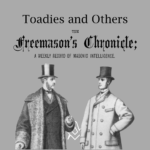 In the realm of Masonry, the principles of equality and respect are paramount. Yet, the presence of toadies—those who obsequiously seek favour from the influential—threatens these ideals. While Masonry embraces diverse beliefs and backgrounds, it rejects the sycophantic behaviours of toadies, flunkeys, and tuft-hunters, urging members to uphold genuine respect and self-worth. The Freemason's Chronicle - 22nd January 1876 |
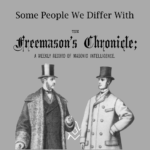 Unveiling the Unpleasant: Some People We Differ With Discover the intriguing dynamics of quarrels within the Masonic brotherhood. From the cantankerous to the litigious, the peevish to the vengeful, delve into the characters that challenge fraternal harmony. Explore their motives, temperaments, and the art of navigating disputes with these fascinating brethren. Brace yourself for a riveting journey into the world of conflicting personalities. |
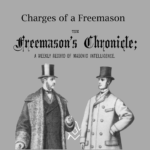 Unravelling the Masonic Mystique: A Deep Dive into the Freemasons' Charges - Explore the intricate world of Freemasonry, its principles, rituals, and the mechanisms for resolving internal disputes. Discover how this ancient fraternity fosters unity, promotes moral conduct, and upholds the sanctity of its secrets, while navigating the complexities of modern society. - The Freemason's Chronicle - 4 December 1875 |
 Unlock the hidden lessons of Masonic Studies! Don't settle for superficial knowledge or mere rituals. Discover the true depth and meaning behind Freemasonry. Expand your understanding of Tracing-Boards, Lectures, and more. Join regular Lodges of Instruction to enhance your Masonic journey. Become a knowledgeable Freemason, not just a token-bearer. Unleash the power of true Masonic wisdom today! |
 Uncover the incredible story of how Masonry saved the life of a Crimean War foot soldier in this historical and masonic account. Through the first hand experience of a soldier engaged in fierce hand-to-hand combat, witness the fateful encounter with a Russian Freemason that changed the course of his life. Learn how brotherhood and a deep dedication to the craft can lead to unforeseen and life-saving circumstances on the battlefield. |
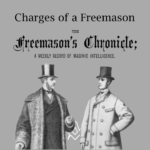 The Freemason's Chronicle - Charges of a Freemason The secrets of Masonry are the exclusive property of the Craft, and can never be communicated to one who is a mere labourer and not an accepted Mason. Hence, no labourer, that is, one who has not been regularly initiated in a legal Lodge. Article first published in The Freemason's Chronicle, 27 November 1875 |
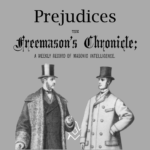 The Freemason's Chronicle - Prejudices Prejudices are partial judgments in favour of, or against certain persons or things, and, for convenience sake, may be ranged in two categories—those which are, comparatively speaking, harmless, and those which are harmful. Article first published in The Freemason's Chronicle, Oct. 2 1875. |
 The Freemason's Chronicle - Cliques Is Freemasonry - a Clique ? Man has been defined as a gregarious animal, but in his highly civilised condition he is gregarious only to a limited extent. First published in The Freemason's Chronicle, Oct. 2 1875, addresses the same challenges then as now. |
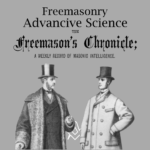 The Freemason's Chronicle - Freemasonry - an Advancive Science Is Freemasonry - an Advancive Science ? Not to confuse advancement with innovation. Has it been the case that Freemasonry's survival for 300 years plus is due to being an Advancive Science, tending to advance. First published in The Freemason's Chronicle 18 September 1875, addresses the same challenges then as now. |
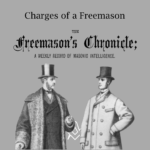 The Freemason's Chronicle - Charges Of A Freemason An interpretation of the "Charges of a Freemason", written Bro. Cornelius Moore and published in 1875, that introduce certain opinions that for some readers, will not sit well in contemporary times. - The Freemason's Chronicle, Sept. 11, 1875 |
 On The Order Of The Temple And Its Doctrine. THE Order of the Temple is divided into two great classes, denominated respectively the Order of the Temple and the Eastern Order. The Eastern Order gave birth to the Order of the Temple, and in the course of time has become an appendage of the latter. It is in ancient Egypt that we find the cradle of the Eastern Order. The Freemason's Chronicle, Sept. 4, 1875 |
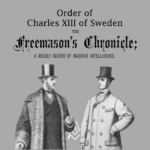 Order of Charles XIII of Sweden The following translation of the Manifesto of King JL Charles XIII of Sweden, on the occasion of his establishing the Masonic Order which bears his name, and of the Statutes of the said Order, may be interesting to our readers. The Freemason's Chronicle, Aug. 28, 1875 |
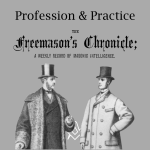 Most of our readers in the course of their experience, have doubtless met with enthusiastic brethren who take it for granted that a Mason can do no wrong. These enthusiasts are thoroughly convinced that the vast majority of those who join the Order are the most benevolent, the most moral, and the very noblest members of society. - The Freemason's Chronicle 10 July 1875 |
 An article investigating the relationship between masonry and citizenship. Are the principles of Freemasonry aligned with the freemason's claim to be a better citizen of the world? The Freemason's Chronicle - 19 June 1875 |
 A visitor must make clear his identity to the satisfaction of the Lodge he proposes to visit. More than once have we been asked to explain our views as to the reception of strangers in a Lodge. - The Freemason's Chronicle - 29 May 1875 |
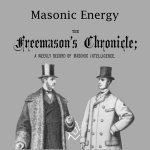 Is there reason in the accusation that Masonic energy looks only to a course of good feeds, when we can point to such grand results as have been achieved in these latter years, both in respect of the extension of our Order ? - 1May 1875 |
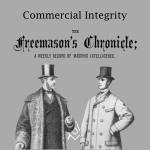 Implementing Freemasonry's peculiar system of morality in our day to day business affairs was the topic of this article, Commercial Integrity, first published in The Freemason's Chronicle - 8 May 1875 |
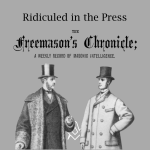 Ridicule has been somewhat illogically described as the test of truth. If it were so, Freemasonry ought to have perished long since. Two press reports from May 1875 covering the |
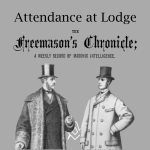 There are many things which Freemasonry will do for a man in the way of opening his mind and giving him larger and kindlier views of life, but Freemasonry itself, cannot eradicate the natural bias of the disposition. |
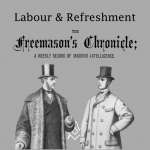 There is, we fear, too marked a tendency in very many Lodges to hasten through its labours, with a view to entering, as soon as possible, upon the business of refreshment. - The Freemason's Chronicle 17th April, 1875 |
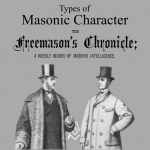 Another example that demonstrates that nothing really changes in Freemasonry. In an article the Types of Masonic Character published 145 years ago in The Freemason's Chronicle 10th April, 1875 |
 A brief history on the relationship between the British Monarchy and the craft - The Freemason's Chronicle 20th March , 1875 |
 What are the qualities of a convivial man and how does this dovetail perfectly in to Freemasonry ? 16th March, 1875 |
 A review of the "Sketch for the History of the Dionysian Artificers," a fragment, by Hyppoli to Joseph Da Costa - This little work may be regarded as, so to speak, the Holy Grail of Masonry. |
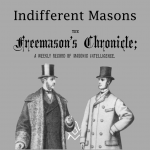 Nothing really changes, an article Indifferent Masons, From Le Monde Maçonnique 1874. Translation published in The Freemason's Chronicle 20th February, 1875 |
 In handling an intruder in the lodge, we endeavoured to show that a good Mason should be a gentleman, and a sincere man. The Freemason's Chronicle 20th February, 1875 |
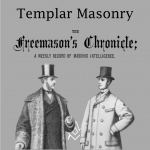 Templar Masonry - a historical aspect of the Religious and Military Order of the Temple published in The Freemason's Chronicle 13th February, 1875 |
 Secrecy perhaps the strongest objection urged by the enemies of the Masonic Order against its existence published in The Freemason's Chronicle 20th March 1875 |
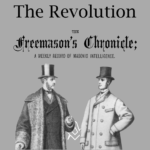 Freemasonry In The United States during And After The Revolution We take a look at Freemasonry in the United States during and after the Revolution first published in The Freemason's Chronicle - February 6, 1875 |
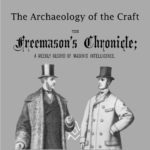 We take a look at the archaeological connection with the Craft, first published in The Freemason's Chronicle - January 30, 1875 |
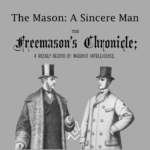 What it means to a Freemason to be a sincere man. Extract: first published in The Freemason's Chronicle - January 23, 1875 |
 What it means to a Freemason to be a citizen of the world ? First published in The Freemason's Chronicle - January 16, 1875 |
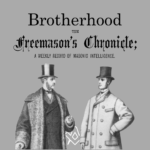 Brotherhood! In that one word what sympathetic associations arise. First published in The Freemason's Chronicle - January 9, 1875 |
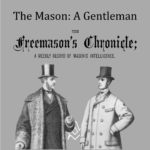 This opening article was written 145 years ago, yet it resonates with Freemasons today as it did then. First published in The Freemason's Chronicle, January 2, 1875, Issue 1 |
masonic knowledge
to be a better citizen of the world
share the square with two brothers

click image to open email app on mobile device






